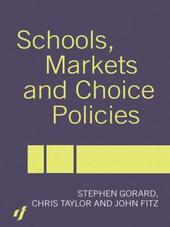
|
Schools, Markets and Choice Policies
Paperback
Main Details
| Title |
Schools, Markets and Choice Policies
|
| Authors and Contributors |
By (author) Stephen Gorard
|
|
By (author) John Fitz
|
|
By (author) Chris Taylor
|
| Physical Properties |
| Format:Paperback | | Pages:240 | | Dimensions(mm): Height 234,Width 156 |
|
| ISBN/Barcode |
9780415304238
|
| Classifications | Dewey:379.2 |
|---|
| Audience | | Tertiary Education (US: College) | | Professional & Vocational | |
|---|
| Illustrations |
black & white illustrations
|
|
Publishing Details |
| Publisher |
Taylor & Francis Ltd
|
| Imprint |
Routledge Falmer
|
| Publication Date |
31 July 2003 |
| Publication Country |
United Kingdom
|
Description
The result of the most exhaustive research ever conducted into choice in secondary education, Schools, Markets and Choice Policies brings together the findings and provides in-depth context, analysis and discussion. In assessing the impact of choice policies not only upon the education system itself, but also upon wider society, it provides valuable insight into economic and social segregation. A groundbreaking contribution to the debate on the role of choice and market economies in education, this book will be essential reading for anyone involved in determining or implementing education policy at all levels.
Author Biography
Stephen Gorard, John Fitz and Chris Taylor are all based at the School of Social Sciences at the University of Wales, Cardiff.
Reviews"This will be a very important book because it reports on the largest and most scientific study of the vast experiment in school choice underway now for years in England and Wales. This is a hugely controversial subject internationally among policy makers, educators, and the parents....The authors are well known and highly regarded in international scholarly circles. Their scientific methodology is sophisticated and well-informed."-William Boyd, Pennsylvania State University "This is a very important book on the subject of choice policies and school segregation. This issue is hotly debated, and extremely ideological. The value of this book is its disciplined combination of quantitative and qualitative methods in anwering questions about the effects of choice policies, an issue with broad international implications."-William A. Firestone, Rutgers University
|